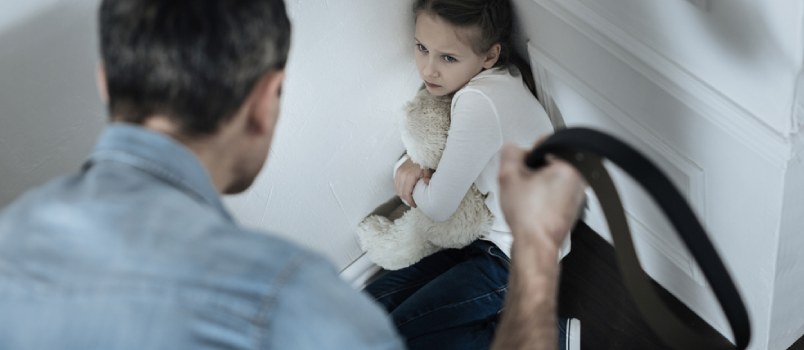Why Beating Children Is Damaging and Disempowering

 Listen to this article
Listen to this articleBeating children is an emotive topic. Some parents wholeheartedly believe that beating children as a form of discipline is perfectly ok while others recoil in horror at the thought. It’s a tricky subject, mainly because humans in general, just like many other creatures learn from those who walk before them – and so if you were disciplined by beatings as a child and don’t realize the potential damage it either has or can cause then it’s perfectly understandable that you would consider beating children to be ok. It’s also worth acknowledging that the process of learning from your elders is a natural and normal way to develop and justify your actions.
However, most people who preceded us made mistakes, society continually makes mistakes, and if we don’t consciously consider and correct our actions rather than unconsciously acting in the way we were taught, then we too can make the same mistakes that our ancestors. And well, we wouldn’t have moved on very much in society if we approached life by unconsciously, repeating the past.
Yikes – if we did we’d all know what it would be like to be whipped and caned!
The point is that just because beating children was the ‘norm’ twenty or thirty years ago, it doesn’t mean it’s right.
Is beating children damaging and disempowering?
Beating children has been proven to be damaging to a child’s psyche and development in many longitudinal studies. It’s a punitive and disempowering act that if most parents realized the consequences, we doubt that there would even be a discussion about whether beating children is appropriate or not.
We know that the parents who are pro beating children love their children and want the best for them just as much as a parent who is against beating children does. It’s just that those who are pro beating children probably haven’t taken the time to consider their actions, research the consequences of beating children and they probably haven’t learned alternative ways to discipline their child.
And let’s be honest, there will be some parents who don’t want to learn, or can’t discipline themselves enough to build and sustain clear and reliable boundaries for their children – we get it, it’s touch.
And while this article may raise some feathers, please, before you rise in anger, or shoot the messenger ask yourself this- Why are you quick to respond to this statement? Have you attempted to understand how beneficial and hugely successful the correct empowering kind of discipline is on the child now and as they reach adulthood?
If you haven’t, and you have children isn’t it time to read just one article to find out more, or take five minutes to reflect on whether beating children really does hold your child’s best interests at heart?
How can you make an informed decision?
It’s possible that if you do this research, and open your mind just for a few moments that you might discover that there are some things about beating children that you’ve assumed and some aspects of alternative and very successful approaches to discipline that you may have overlooked.
Of course, this pattern of overlooking something beneficial is normal and also ingrained in us but it doesn’t have to be that way. Raising children is a challenge and nobody is perfect but you have the opportunity to ring the changes and find even better ways to help your child become the confident adult that they deserve to become.
It’s possible to gain respect from your child with fair boundaries
With the hands-off techniques of approaching discipline and firm boundaries you’ll never be pushed so far by your child that you even consider beating children as a form of punishment again – your kids might just seem like angels.
There are many hugely successful techniques available to avoid beating children as a form of discipline, and many are available free online – it just takes a little bit of research and focus. But beware, as you start to implement these changes your child will protest.
Your child will challenge the first stages of changing your practices at home and your new boundaries because they won’t feel in control. But if you think of the long game these boundaries will prevent the child from escalating their behavior to a point where you’ve had enough and reassure your child – they just don’t know that yet.
Of course, your children won’t like the rules at first, however, as they learn them, and understand what they need to do they learn to rely on a constructive sequence of events, which helps them to feel very secure and confident, that their world is safe and that they can trust you implicitly. When you get to this stage you’ll find that your children will generally go along with your plans without too much fuss.
Temper tantrums become a thing of the past
The days of frustrating temper tantrums, endless bedtime routines, and difficult trips out will be over, and when your child grows up to be too big to take a beating, they will still respect your boundaries.
Which means that when you ask your young adult not to do something or talk to them about their poor choices and if you need to ask them to stay safe your wishes and voice will be respected, acknowledged and even discussed instead of ignored – which is often the case for a child who has been disciplined through the act of beating children.
Which outcome would you prefer?
 Tips
Tips
Write your tip or submit a video tip
All tips are reviewed before the publishing.
Share this article on
Want to have a happier, healthier marriage?
If you feel disconnected or frustrated about the state of your marriage but want to avoid separation and/or divorce, the marriage.com course meant for married couples is an excellent resource to help you overcome the most challenging aspects of being married.

























 We'd love your feedback!
We'd love your feedback! Thanks for your feedback!
Thanks for your feedback!
